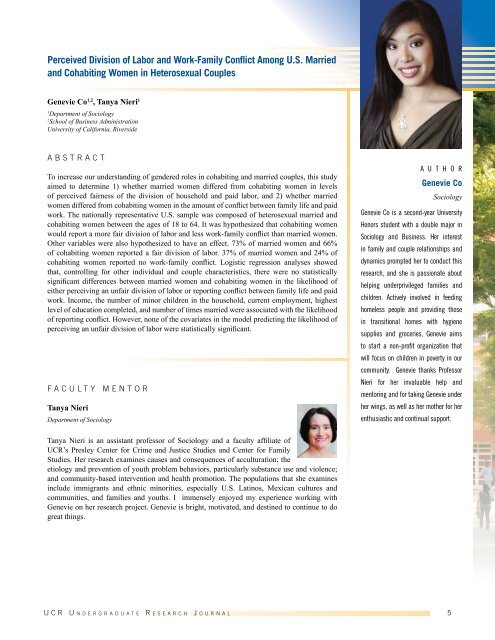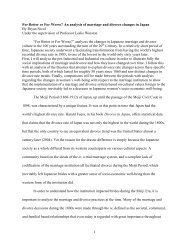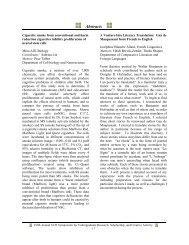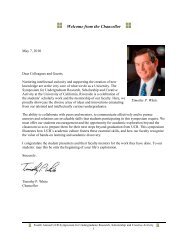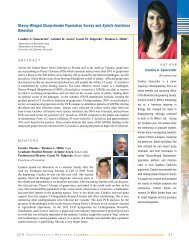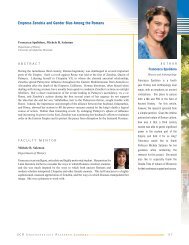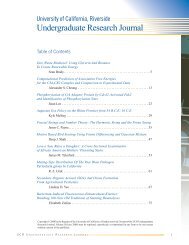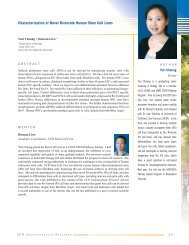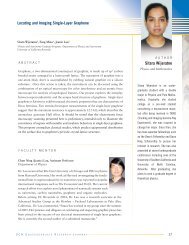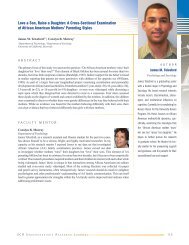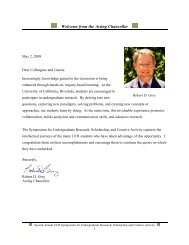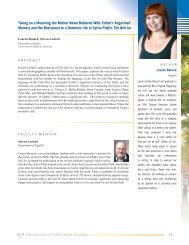Undergraduate Research Journal
Undergraduate Research Journal
Undergraduate Research Journal
You also want an ePaper? Increase the reach of your titles
YUMPU automatically turns print PDFs into web optimized ePapers that Google loves.
Perceived Division of Labor and Work-Family Conflict Among U.S. Married<br />
and Cohabiting Women in Heterosexual Couples<br />
Genevie Co 1,2 , Tanya Nieri 1<br />
1<br />
Department of Sociology<br />
2<br />
School of Business Administration<br />
University of California, Riverside<br />
ABSTRACT<br />
To increase our understanding of gendered roles in cohabiting and married couples, this study<br />
aimed to determine 1) whether married women differed from cohabiting women in levels<br />
of perceived fairness of the division of household and paid labor, and 2) whether married<br />
women differed from cohabiting women in the amount of conflict between family life and paid<br />
work. The nationally representative U.S. sample was composed of heterosexual married and<br />
cohabiting women between the ages of 18 to 64. It was hypothesized that cohabiting women<br />
would report a more fair division of labor and less work-family conflict than married women.<br />
Other variables were also hypothesized to have an effect. 73% of married women and 66%<br />
of cohabiting women reported a fair division of labor. 37% of married women and 24% of<br />
cohabiting women reported no work-family conflict. Logistic regression analyses showed<br />
that, controlling for other individual and couple characteristics, there were no statistically<br />
significant differences between married women and cohabiting women in the likelihood of<br />
either perceiving an unfair division of labor or reporting conflict between family life and paid<br />
work. Income, the number of minor children in the household, current employment, highest<br />
level of education completed, and number of times married were associated with the likelihood<br />
of reporting conflict. However, none of the covariates in the model predicting the likelihood of<br />
perceiving an unfair division of labor were statistically significant.<br />
Faculty Mentor<br />
Tanya Nieri<br />
Department of Sociology<br />
A U T H O R<br />
Genevie Co<br />
Sociology<br />
Genevie Co is a second-year University<br />
Honors student with a double major in<br />
Sociology and Business. Her interest<br />
in family and couple relationships and<br />
dynamics prompted her to conduct this<br />
research, and she is passionate about<br />
helping underprivileged families and<br />
children. Actively involved in feeding<br />
homeless people and providing those<br />
in transitional homes with hygiene<br />
supplies and groceries, Genevie aims<br />
to start a non-profit organization that<br />
will focus on children in poverty in our<br />
community. Genevie thanks Professor<br />
Nieri for her invaluable help and<br />
mentoring and for taking Genevie under<br />
her wings, as well as her mother for her<br />
enthusiastic and continual support.<br />
Tanya Nieri is an assistant professor of Sociology and a faculty affiliate of<br />
UCR’s Presley Center for Crime and Justice Studies and Center for Family<br />
Studies. Her research examines causes and consequences of acculturation; the<br />
etiology and prevention of youth problem behaviors, particularly substance use and violence;<br />
and community-based intervention and health promotion. The populations that she examines<br />
include immigrants and ethnic minorities, especially U.S. Latinos, Mexican cultures and<br />
communities, and families and youths. I immensely enjoyed my experience working with<br />
Genevie on her research project. Genevie is bright, motivated, and destined to continue to do<br />
great things.<br />
U C R U n d e r g r a d u a t e R e s e a r c h J o u r n a l 5


